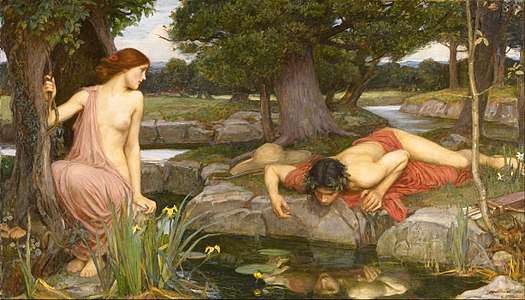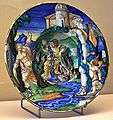Echo and Narcissus
Echo and Narcissus is a myth from Ovid's Metamorphoses, a Roman mythological epic from the Augustan Age. The introduction of the myth of the mountain nymph Echo into the story of Narcissus, the beautiful youth who rejected Echo and fell in love with his own reflection, appears to have been Ovid's invention. Ovid's version influenced the presentation of the myth in later Western art and literature.

Story
The myth of the goddess is told in Book III of the Metamorphoses, and tells the story of a "talkative nymph" whom the goddess Venus admires for her magnificent voice and song. When she tricks Juno into believing that her husband, Jupiter, was in the city, Juno curses Echo by making her able to only finish a sentence not started, and unable to say anything on her own. "Yet a chatterbox, had no other use of speech than she has now, that she could repeat only the last words out of many." This is the explanation of the aural effect which was named after her. She falls in love with Narcissus, whom she catches sight of when he is "chasing frightened deer into his nets." Eventually, after "burning with a closer flame," Echo's presence is revealed to Narcissus, who, after a comic, yet tragic scene, rejects her love. Echo prays, in her mind, of this to Venus, who makes Echo disappear, until she "remains a voice" and "is heard by all."
Then, Narcissus "tired from both his enthusiasm for hunting and from the heat" rests by a spring, and whilst drinking, "a new thirst grows inside him" and he is "captivated by the image of the beauty he has seen". He falls deeply in love with "all the things for which he himself is admired." He then wastes away with love for himself, echoing the manner in which Echo did earlier. A while later his body is gone, and in its place is a narcissus flower. The pale flower is still found near river banks so that it can be reflected in the water.
Gallery
 Francesco Xanto Avelli, Echo, Amor en Narcissus (1535)
Francesco Xanto Avelli, Echo, Amor en Narcissus (1535)%2C_Museo_del_Louvre%2C_Parigi..jpg) Nicolas Poussin, Écho et Narcisse (ca. 1629–1630)
Nicolas Poussin, Écho et Narcisse (ca. 1629–1630) Benjamin West, Narcissus and Echo (1805)
Benjamin West, Narcissus and Echo (1805)